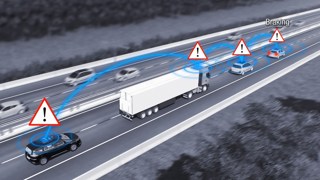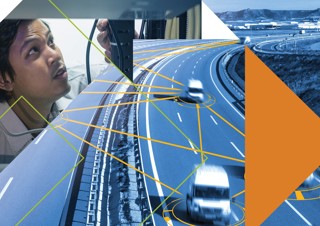Real-time, personalised travel information, which has the potential to make roads safer and improve journey times, will be tested in a pilot project starting in November.
Allowing vehicles to communicate with other vehicles and infrastructure, the ‘connected corridor’ will run between London and Dover. Known as the A2M2 connected corridor, it could be fully connected by summer 2020.
Infrastructure firm Costain is working with a group of companies to deliver the project after winning the contract from Highways England for an undisclosed sum.
The first stage of the pilot will cover 2.5 miles before expanding to 12 miles in spring 2019. After this first phase, there will be a review and the trial could then be expanded to 34 miles in 2020 before stretching out to cover the entire route from London to Dover by summer 2020.
Costain will be working with the Department for Transport (DfT), Transport for London (TfL) and Kent County Council to design, install and implement the pilot, which it says will be key in preparing the UK’s roads for autonomous vehicles.
A consortium of companies working on the project also includes Mott MacDonald, 4way Consulting, TRL, Kapsch TrafficCom AG, Altran, Cohda Wireless, Telent Technology Services and Telefonica.
Ian Henderson, Costain service delivery director, technology capability, told Fleet News that connected and autonomous vehicles of the future need to be fed with controlled data to operate safely.
He said: “The pilot has the potential to generate useful data, such as speed of prevailing traffic, trends and even road conditions.
“The way in which information is shared between vehicles, users and the infrastructure is yet to be established and the trial looks at the interoperability of different methods from roadside infrastructure to cellular network developments.”
Henderson said the end benefits to all drivers, including company car drivers, is they will be able to travel in a safer and more informed capacity.
He explained: “A connected network is inherently safer due to the driver having far greater knowledge of what is happening further up a road.
“The technology will provide this information to drivers – enabling them to make decisions about how they drive and the route they take.”
Henderson said information from connected roads will also help with congestion concertinas where traffic comes to a stop and then restarts.
“The method of communication will not just mean vehicles are connected but are also in certain aspects autonomous – and this is where the end user benefit can be seen,” he said.
Within the A2M2 connected corridor contract, Costain will be testing the wireless transmission of data to and from travelling test vehicles.
Trial vehicles will be fitted with onboard technology that will link communication between the car and the roadside wirelessly. This will relay information to the vehicle relating to road works, road conditions, temporary speed limits and the time remaining before a traffic light turns to green. The information could then be used by the vehicle to vary speed, for example.
Information from the pilot will be used by the Government to develop connected vehicle standards and facilitate a widescale deployment of connected vehicle technology.
Henderson said: “With this pilot, combined with others around the country, we are able to test the security, speed and interoperability of communication options in various physical environments and are able to consider the impact of different power supplies and constraints.”
Mike Wilson, safety, engineering and standards executive director, Highways England, is expecting connected road technology to improve journeys by making them safer and more reliable.
He said: “Having the technology in place will allow vehicles to connect to each other and the road around them by providing real-time, personalised information directly to the driver.
“It could also help us manage traffic and respond to incidents. The A2M2 trial will test and demonstrate how this may work in the real world.”
The connected road pilot follows on from Costain winning another contract from Highways England in May this year to supply Motorway Incident Detection and Automatic Signalling (MIDAS) technology systems.
The company will supply 1,500 MIDAS outstation units over a two-year period. MIDAS is the Highways England system that uses road sensors to detect congestion and display messages on signs to alert motorists.



















Login to comment
Comments
No comments have been made yet.